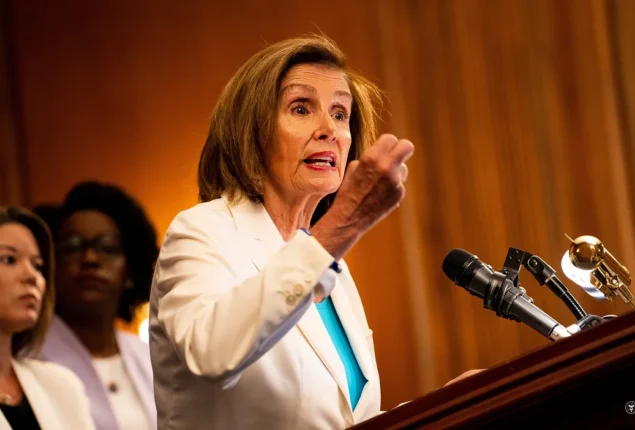Empty threats or danger awaits: China boils over Pelosi Taiwan visit
Pelosi's planned trip has presented a quandary for the U.S. and China....

Nancy Pelosi and her war with Beijing
Nancy Pelosi, the US House of Representatives Speaker, has a lengthy history of criticising the Chinese government, which has incensed China and given the White House diplomatic headaches.
Nancy Pelosi most famously visited Tiananmen Square in 1991, two years after large-scale protests in Beijing were suppressed by the Chinese government, and exhibited a banner honouring the slain protestors.
The Chinese government, for its part, has made no secret of its contempt for Ms Pelosi, labelling her “full of lies and deception.”
China regards self-governed Taiwan as a renegade province and has not ruled out using force to bring it back together. It exerts tremendous pressure on other countries to prevent them from recognising Taiwan’s independence.
It has threatened Ms Pelosi with terrible consequences if she visits Taiwan.
She would be the most senior US politician to visit the island since her predecessor, Newt Gingrich, in 1997.
Ms Pelosi is expected to visit Singapore, Indonesia, and Japan in early August, but it is unclear whether she will stop in Taiwan.
With US-China relations still high, even White House officials are said to have tried to persuade her not to do so. According to US President Joe Biden, “the military thinks it’s not a good idea.”
However, this is not the first time Ms Pelosi has enraged Chinese authorities.
Two years after protesters in Beijing’s Tiananmen Square were repressed by Communist Party soldiers, the then-California representative paid a visit to the capital city.
She and two other members of Congress slipped away from their official escorts and headed to the city plaza without the approval of their Chinese hosts.
They unfurled a little black banner there. The hand-painted banner read, “To those who perished for democracy in China.”
The police moved fast, roughing up reporters covering the event and driving lawmakers out of the square.
The incident was later labelled a “premeditated farce” by China’s Foreign Ministry.
Some have criticised Ms Pelosi’s activities during her visit in 1991. Mike Chinoy, former CNN Beijing bureau chief, claimed in an op-ed for Foreign Policy that she was the reason he was arrested at the scene.
Mr Chinoy claimed he was unaware of Ms Pelosi’s plans for the square and was kept for several hours because authorities were unable to identify a visiting foreign dignitary.
“It was my first experience with Pelosi’s penchant for high-profile gestures designed to poke China’s communist rulers in the eye – regardless of the consequences,” he wrote.
Ms Pelosi, who also co-authored a resolution denouncing China’s conduct in 1989, has often spoken out against the “massacre” of demonstrators over the years.
She recently made a statement commemorating the 33rd anniversary of the protests, calling it “one of the greatest acts of political courage” and slamming the Communist Party’s “oppressive regime.”
Ms Pelosi attempted to transmit four letters to then-Chinese Vice-President Hu Jintao in 2002, expressing concern over the detention and imprisonment of activists in China and Tibet and begging for their release.
Mr Hu turned down the letters.
Ms Pelosi reportedly hand-delivered another letter to Mr Hu – then-President of China – seven years later, demanding the release of political prisoners, including prominent dissident Liu Xiaobo.
Liu was selected as the 2010 Nobel Peace Prize winner but was not permitted to go to Norway to claim the honour. While still in Chinese detention, he died of cancer in 2017.
Ms Nancy Pelosi has opposed China’s aspirations to host the Olympics since 1993, citing alleged human rights violations.
She was one of the congressmen that unsuccessfully pushed then-US President George W Bush to boycott China’s opening ceremony for the Summer Olympics in 2008.
This year, the Speaker of the House spearheaded demands for a “diplomatic boycott” of the 2022 Winter Olympics in Beijing due to China’s treatment of Uyghur Muslims.
“For heads of state to go to China in light of a genocide that is ongoing – while you’re sitting there in your seat – really begs the question, what moral authority do you have to speak again about human rights any place in the world?” she said.
In response, a spokesman for the Chinese embassy in Washington stated that US lawmakers were not in a position to level “wanton groundless criticism” against China.
Ms Pelosi has also advocated for China’s trading position to be connected to its human rights record, as well as for restrictions to be attached to China’s membership in the World Trade Organization.
Mr Bush vetoed legislation linked to this multiple times, whereas previous President Bill Clinton first backed but ultimately abandoned it, claiming that broader American strategic interests justified the change.
Catch all the World News, Breaking News Event and Latest News Updates on The BOL News
Download The BOL News App to get the Daily News Update & Follow us on Google News.